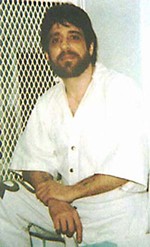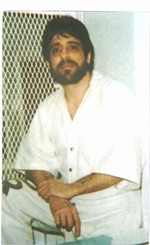Death Row Case Evidence May Never Be Tested
When technicalities take precedence over finding out who done it
By Jordan Smith, Fri., March 12, 2010
Unless the U.S. Supreme Court intervenes, it is likely that 47-year-old death row inmate Hank Skinner will be executed on March 24 without key pieces of physical evidence in his case ever having been tested. "We continue to hope that the court will intervene to ensure that Mr. Skinner is not executed before the troubling doubts about his guilt can be resolved through scientific evidence," Skinner's attorney, Rob Owen – who is also director of the Capital Punishment Clinic at the University of Texas' law school – told the Associated Press earlier this month.
Skinner was convicted and sentenced to death for the 1993 New Year's Eve killings of his longtime girlfriend, Twila Busby, and her two grown sons, who were both mentally impaired and living at home with the couple in the Panhandle town of Pampa. Busby was strangled and then beaten to death so viciously that pieces of her skull were embedded into her brain; her sons, both of whom were large young men, were stabbed several times. Skinner was home that evening but has insisted he is innocent. He could not have killed Busby or her sons because he was nearly comatose on a combination of pills and booze, argue his defenders; even if he had been awake, they say, he would not have had the strength or coordination to incapacitate three adults. (Toxicology testing revealed a near fatal dose of drugs in Skinner's system.) Skinner "undoubtedly was inside the house when these brutal attacks occurred," Owen wrote in an appeal to the high court in February (at press time the appeal was still pending). But there is "substantial reason to doubt that ... Skinner could have committed the murders, given the abundant evidence that he was completely incapacitated by the extreme quantities of alcohol and codeine he had consumed earlier that evening."
The state argued that Skinner, who had a reputation as a drinker, had a high tolerance and thus likely wasn't as impaired as one might expect – an argument with which the jurors apparently agreed. Still, the state has never tested numerous items of evidence taken from the crime scene – including clippings taken from Busby's nails, a rape-kit test, two knives, and hair found on a windbreaker stained with sweat. Gray County District Attorney Lynn Switzer has objected to any testing of this evidence, saying that Skinner had a chance to do so before his 1995 trial but didn't take it – whether that evidence would reveal that she and her predecessors were wrong about Skinner's guilt – allowing a killer to remain on the loose for more than a decade – is apparently none of her concern.
It would seem that the Court of Criminal Appeals, which has so far denied Skinner's appeals to conduct the DNA testing that could either clear his name or definitively prove his guilt, is of the same opinion. In 2001 state lawmakers penned a post-conviction DNA testing law that would allow inmates to have biological evidence tested for cases in which there had previously been no access to testing, advancements in testing might produce more probative results, or, "through no fault of the convicted person," the evidence had not been previously tested, but "the interests of justice require DNA testing." While the third standard would seem to apply to Skinner's case, the courts so far have not agreed: Apparently it is Skinner's "fault" that his lawyer had not previously had the evidence tested. The ruling is troubling to Owens; for starters, it doesn't make sense that Skinner could have waived his right to testing years before the law even existed. But more disturbing, perhaps, is the court's apparent interpretation of the term "fault." In "most places where the law uses the concept of fault it implies ... a lack of diligence" or other culpable state, he said. The CCA's ruling here is a "jarring" redefinition of fault that suggests that if a lawyer advises his client not to conduct testing, for whatever reason, and the client agrees, that could be considered a complete waiver of the right to ever have the evidence tested. "It seems to me they're exalting technicalities over the substance" of the law.
Whether Skinner will ever get a chance to have that evidence tested remains entirely unclear – indeed, he has been seeking access to the evidence since 2000. In November 2009, Owen filed a federal civil suit against Switzer, seeking access to the evidence, arguing that Skinner's right to due process has been violated. The district court and U.S. 5th Circuit Court of Appeals have to date ruled that he is not entitled to that evidence under the federal statute. An appeal of that decision is currently pending before the high court. If the court accepts the case and rules in Skinner's favor, the case will go back to district court, where Skinner will have a chance to argue, once more, that he should be allowed access to the as-yet-untested evidence.
Got something to say on the subject? Send a letter to the editor.











